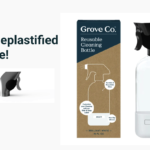DTP: Grove Collaborative
Sudeshna Naik, Akash Mahajan, Mia Thomas, Allisia Sandoval, Thibaud Huriez

Plastic pollution has surfaced as one of the most pressing environmental issues, and rapidly increasing production of single use plastics has overwhelmed the world’s ability to deal with it. Every day, U.S. companies create more than 76 million pounds of plastic packaging, and only 9% of plastic gets recycled. The rest ends up in nature and the oceans. With rising awareness of the harmful nature of plastics, a growing number of companies have committed to reducing their plastic production and usage, and one of them is Grove Collaborative, who believe that the solution to this crisis is to stop making plastic. Period.
Grove Collaborative is a San-Francisco based leading socially responsible sustainable cleaning company whose mission is to be 100% plastic free by 2025. Grove has already taken the next step to minimize the usage of single use plastic by creating cleaning concentrates in reusable glass bottles. But their products are not 100% plastic free yet and that’s where the DTP team stepped in.
The challenge the team was initially solving here was “How might we design a plastic-free, circular end of life sprayer for their liquid products?” “Great! This just needs to be replicated with bio-plastic, super-easy.” Team’s first thought. But they were wrong, and here’s why. Grove had laid down a list of constraints for them: the price needs to be around $2, bio-plastics are off the table, follow the same customer convenience, must spray, be more durable, and have a circular life-cycle. From these constraints the team narrowed down the challenge into a singular problem statement, “How might we redesign a new plastic-free sprayer that is ergonomically and aesthetically finer than the existing sprayer ?”
Grove’s current bottle and sprayer has 9 parts. It’s very complex and each of these pieces are made of different materials which makes it nearly impossible to recycle. To recycle it, one needs to take it apart piece by piece and recycle each part. Because most people can’t do this the majority of these mechanisms end up in the landfill.
To align with Grove’s mission and brand the team decided to look solely into carbon neutral and carbon negative materials. And ultimately decided Stainless steel and silicone as the best options. Stainless steel has a lifespan of around 20 years and after that it is infinitely recyclable. Upon testing with Grove cleaning products it was learned that stainless steel is compatible, and does not stain or corrode. Silicone is durable, flexible and washable which makes it ideal for this product. It does not support mycobacterial growth which is perfect for the natural non preservative products that Grove uses. It does not react with the current cleaning products and can be recycled separately after its life span of 10-20 years.
To incorporate these materials, the team started exploring various mechanisms and designs. And realized to find the best solution the inspiration needed to be taken from the past: vintage perfume bottles, the nature: spitting cobra and incorporating the modern form and comfort of the sprayer. And the final design was a novel mechanism which combines the best out of all the inspirations and opened the possibility to build a sprayer with minimum parts and plastic free. A sprayer with an atomic bulb pump as a reservoir, which spits the liquid when pressed.
Environmental consciousness is a goal for many companies; however, because of issues such as budgeting, logistics, or convenience, they aren’t able to follow the path. However, the DTP team provided a solution that was aligned with Grove’s goal of having a plastic-free product as well as satisfied all of Grove’s demands.
